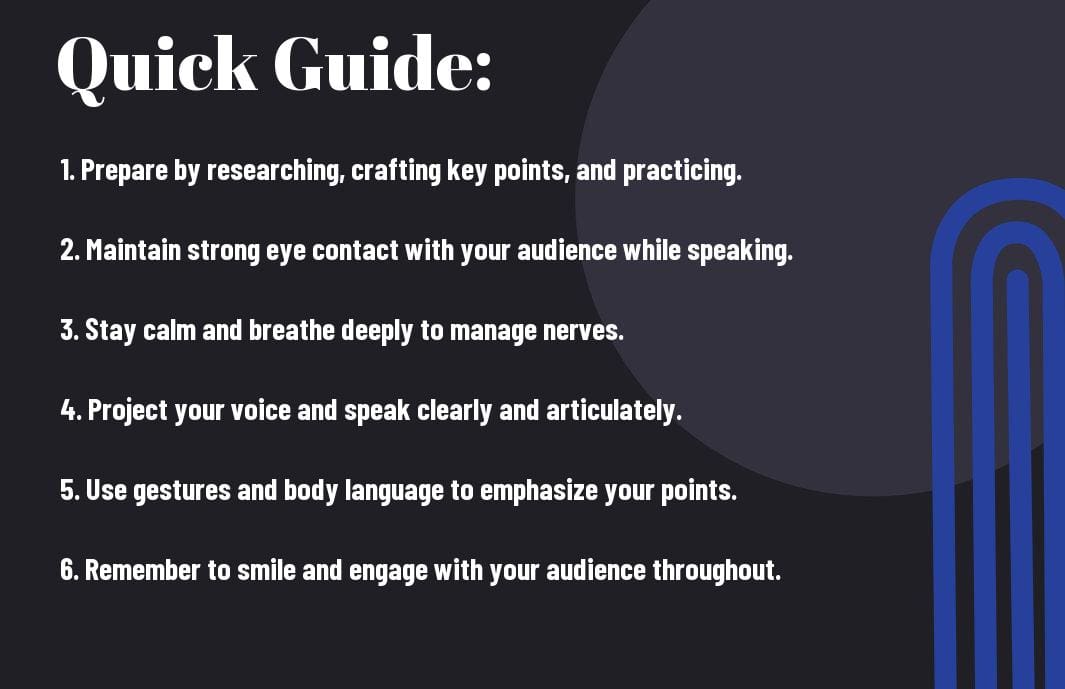You have an important presentation coming up, and the thought of speaking in public is making you nervous. But fear not, this guide will equip you with the tools and techniques to speak with confidence and ace your next public speaking engagement. From battling nerves to crafting a compelling speech, we will cover key strategies to help you command the room and leave a lasting impression on your audience. Whether you are a seasoned speaker looking to enhance your skills or a novice stepping onto the stage for the first time, this guide will empower you to succeed in the art of public speaking.
Key Takeaways:
- Preparation is key: Practice your speech multiple times, familiarize yourself with the content, and anticipate potential questions from the audience.
- Confidence is contagious: Stand tall, make eye contact, and use assertive body language to exude confidence and capture the attention of your audience.
- Engage with your audience: Connect with your audience by telling stories, asking thought-provoking questions, and being authentic to create a memorable and impactful speech.


Types of Public Speaking
Assuming you are gearing up for a public speaking engagement, it’s vital to understand the different types of public speaking you may encounter. Below we break down the main categories:
| Informative Speeches | Persuasive Speeches |
| Inspirational Speeches | Ceremonial Speeches |
Informative Speeches
One of the most common types of public speaking is delivering informative speeches. In this type of speech, the speaker aims to impart knowledge, share insights, and educate the audience on a specific topic. It is crucial to organize the information in a clear and structured manner to ensure the audience grasps the key points effectively.
Persuasive Speeches
Types of public speaking that are persuasive require the speaker to influence the audience’s beliefs, attitudes, or behaviors. This can be achieved through effective arguments, compelling evidence, and persuasive language. It’s important for speakers to establish credibility and connect emotionally with the audience to drive their message home.
Inspirational Speeches
For speeches aimed at inspiring the audience, speakers often share personal stories, motivational quotes, or anecdotes to evoke strong emotions and drive positive change. For instance, leaders often deliver inspirational speeches to uplift and motivate their teams, making them feel empowered and capable of achieving their goals.
Ceremonial Speeches
Assuming you are tasked with delivering a ceremonial speech, it’s crucial to understand the purpose and tone of the occasion. Whether it’s a graduation ceremony, a wedding toast, or a eulogy, ceremonial speeches aim to celebrate, honor, or commemorate a special event or individual. A speaker must strike the right balance between formality and emotion to ensure the speech resonates with the audience.
Factors That Influence Speaking Confidence
For individuals looking to enhance their public speaking skills, it is crucial to understand the various factors that can influence their speaking confidence. By addressing these key elements, speakers can improve their performance and deliver impactful presentations. Here are some important factors to consider:
- Understanding the Audience: Effective speakers tailor their message to the needs and interests of their audience. This involves researching the demographics, interests, and preferences of the listeners to create a connection and engage them effectively.
- Knowledge of the Topic: A thorough understanding of the subject matter is crucial for building confidence in public speaking. When speakers are well-versed in their topic, they can speak more confidently and handle questions or objections with ease.
- Personal Speaking Style: Each individual has a unique speaking style that reflects their personality and communication preferences. Embracing and developing this personal style can enhance confidence and authenticity in presentations.
Understanding the Audience
Factors such as audience demographics, preferences, and expectations play a significant role in shaping speaking confidence. By tailoring the message to resonate with the audience, speakers can establish a stronger connection and build rapport effectively.
Knowledge of the Topic
Now, let’s explore deeper into the importance of knowledge of the topic in boosting speaking confidence. A comprehensive understanding of the subject matter not only instills confidence in the speaker but also enhances credibility and trust among the audience.
Understanding Personal Speaking Style: Embracing one’s unique speaking style involves recognizing strengths and areas for improvement in communication. By adapting the delivery to align with personal preferences, speakers can exude confidence and authenticity on stage.
Assume that speakers who invest time in refining their personal speaking style are more likely to engage and captivate their audience effectively.
Step-by-Step Guide to Preparing a Speech
| Topic Selection and Audience Analysis | Research and Content Organization |
| Any great speech starts with a well-chosen topic and a thorough understanding of the audience. Consider the interests, knowledge level, and demographics of your audience to tailor your message effectively. | Analysis and organization of content are crucial for a coherent and impactful speech. Conduct thorough research on your topic to support your main points and create a logical structure for your presentation. |
Crafting Your Presentation
There’s an art to crafting a compelling presentation that captures and maintains the audience’s attention. Ensure your speech has a strong opening, clear main points, and a powerful conclusion to leave a lasting impression.
With careful selection of your language, visuals, and overall delivery, you can enhance the effectiveness of your message and connect with your audience on a deeper level.
Rehearsal Techniques
Presentation rehearsals are key to building confidence and refining your delivery. Practice in front of a mirror, record yourself, or rehearse with a trusted friend to receive feedback and improve your performance.
A well-rehearsed speech not only helps you deliver your message smoothly but also allows you to focus on engaging with the audience and conveying your message with confidence.
Tips for Delivering Your Speech
Despite the nerves that may come with public speaking, it is crucial to deliver your speech with confidence and authority. Here are some tips to help you shine on stage:
Overcoming Nervousness
One of the best ways to overcome nervousness before a speech is to practice and be prepared. Breathing exercises and visualization techniques can also help calm your nerves.
Effective Body Language
The way you carry yourself on stage can significantly impact how your message is received. The proper posture, gestures, and eye contact can convey confidence and engage your audience.
For instance, maintaining an open posture and making eye contact with individuals in different parts of the room can help you connect with your audience and appear more confident.
Voice Modulation and Clarity
To keep your audience engaged, it is crucial to vary your tone and volume while speaking. Enunciate your words clearly to ensure that everyone can follow along with your message.
Speech that is monotone or too quiet can bore your audience and cause them to lose interest in what you are saying. Varying your tone and volume can help maintain their attention and emphasize key points.
Engaging Your Audience
Some effective ways to engage your audience include asking thought-provoking questions, telling relevant stories, and using visual aids to support your points. By involving your audience in your speech, you can create a more interactive and memorable experience for everyone.
Clarity in your message and delivery is crucial for ensuring that your audience understands and retains the information you are presenting.
The Pros and Cons of Different Presentation Aids
Visual Aids
Visual aids can significantly enhance a presentation by providing a visual representation of key points. They can help clarify complex information, engage the audience, and improve retention. However, overusing visual aids can be distracting and take away from the speaker’s message. It’s important to strike a balance and use visuals strategically to support your speech.
Handouts and Materials
Clearly organized handouts and materials can serve as valuable resources for the audience to refer back to after the presentation. They can provide additional information, reinforce key points, and enhance the overall learning experience. However, relying too heavily on handouts can discourage active listening and engagement with your presentation. It’s important to use handouts sparingly and ensure they complement, rather than overshadow, your verbal delivery.
Not every presentation aid is suitable for every occasion. It’s important to consider the context of your presentation, your audience, and the message you want to convey when choosing which aids to use.
Technology Integration
While technology integration can modernize a presentation and add a dynamic element, it also comes with its own set of challenges. Technical issues such as connectivity problems, compatibility issues, or equipment failures can disrupt the flow of your presentation and detract from your message. It’s crucial to familiarize yourself with the technology beforehand and have backup plans in place to mitigate any potential issues.
To wrap up
Upon reflecting on “Speak With Confidence – A Guide To Public Speaking Success”, it is clear that mastering the art of public speaking is imperative for personal and professional growth. This guide has provided valuable insights and practical tips to help readers overcome their fears, improve their communication skills, and deliver impactful presentations. By putting these strategies into practice, individuals can enhance their confidence, presence, and influence when speaking in front of an audience. Do not forget, public speaking is a skill that can be developed with practice and persistence. With the right mindset and preparation, anyone can become a successful and effective public speaker. So go ahead, step out of your comfort zone, and showcase your voice with confidence!
FAQ
Q: Why is public speaking important?
A: Public speaking is important because it allows individuals to communicate ideas effectively, influence others, and showcase their expertise. It is a valuable skill in various aspects of life, including business, education, and personal development.
Q: How can I overcome fear of public speaking?
A: To overcome fear of public speaking, you can practice regularly, prepare thoroughly, visualize success, focus on your message rather than your nerves, and seek feedback from others. Additionally, deep breathing exercises and positive self-talk can help manage anxiety.
Q: What are some tips for speaking with confidence?
A: Tips for speaking with confidence include maintaining eye contact with your audience, speaking clearly and at a moderate pace, using gestures to emphasize points, and projecting your voice effectively. It is also important to know your material well, engage with your audience, and exude enthusiasm for your topic.




